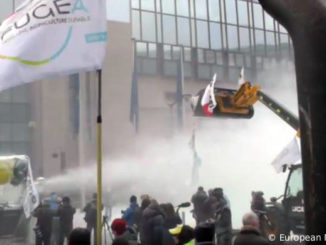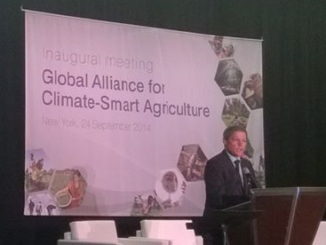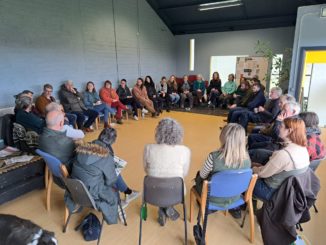Updated 01.43 02/12/2015 (photos, videos and info on #COP21 events in Paris)
As the the 21st Conference of the Parties to the United Nations Framework Convention on Climate Change – COP21 begins in Paris, events has been held in 185 countries to put pressure on the negotiators to work hard – and beyond their own national interest – to reach a deal to prevent runaway climate change.
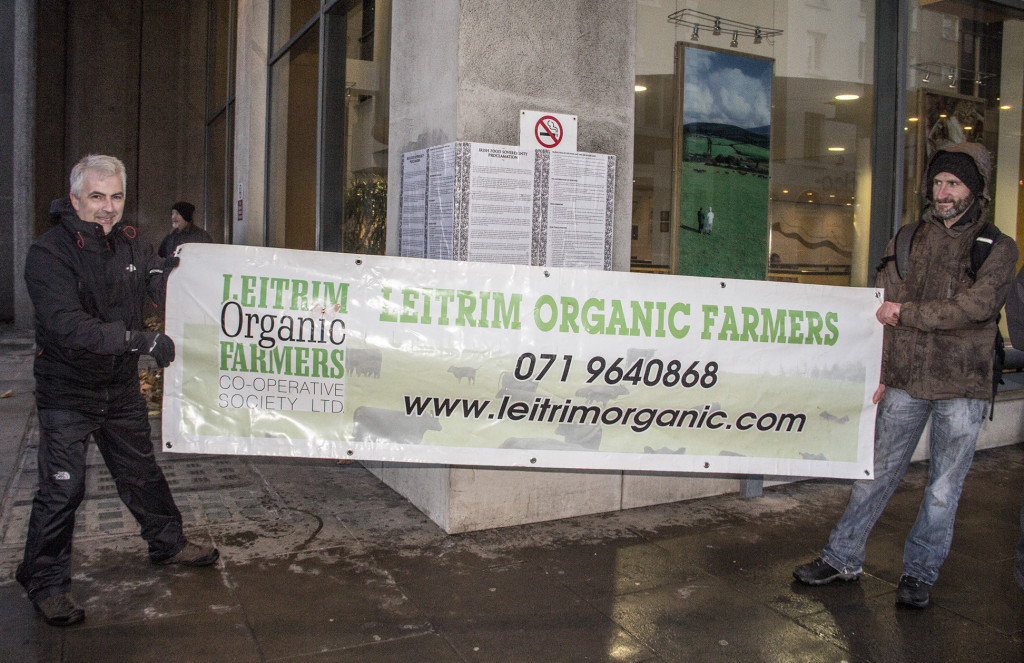
Agri-food activists took part in many of these events, including in Ireland. There, after the 5000 person Climate March, a group from Food Sovereignty Ireland marched to the Irish Department of Agriculture’s building – Ag House – and pasted their Food Sovereignty Proclamation for Ireland to the building.
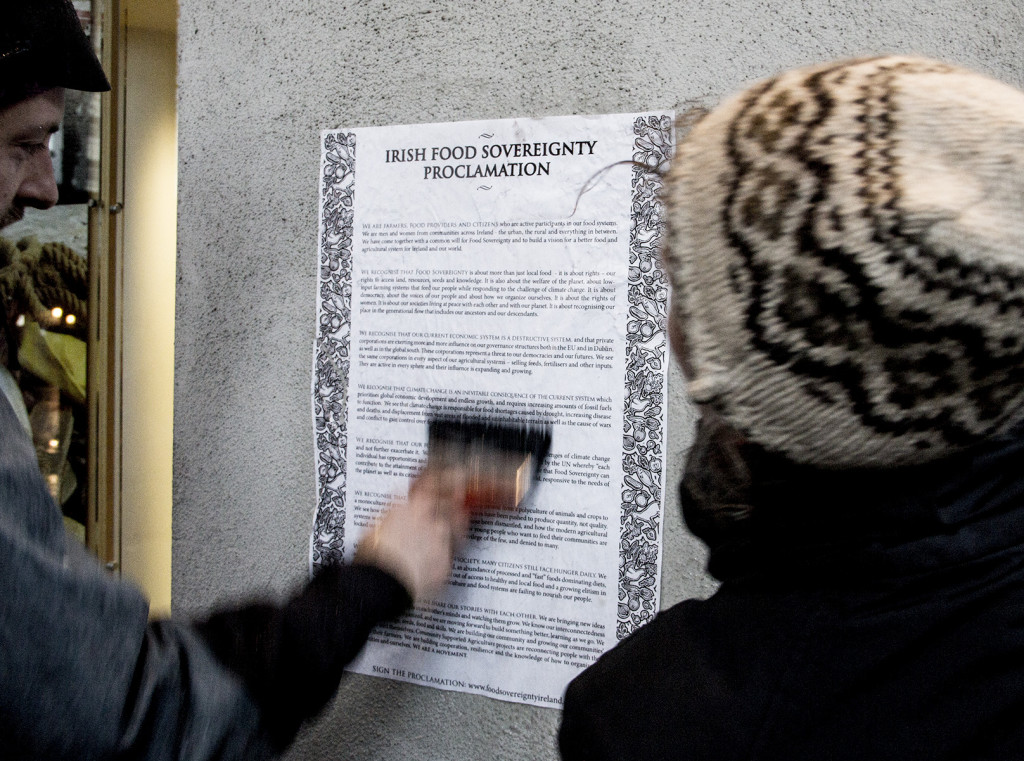
This group included the Leitrim Organic Farmers’ Co-operative, AFRI and the newly formed CSA network for Ireland, including Derrybeg CSA.
There Fergal MacAindir of Food Sovereignty Ireland and the Leaf and Root Farm CSA in Galway spoke of the need for Ireland to produce healthy sustainable food for its people.
50,000 participants, and an as yet unknown number of concerned citizens and activists will descend upon the French capital between now and 12th December.
ARC2020 will be in Paris over the next two weeks, with dedicated articles from Pavlos Georgiadis covering all the important aspects of the negotiations and the action. Concurrently, members of the ARC2020 team will be in Paris to meet with others from the world of people-and-planet orientated farming and food.
While the security situation has made things more uncertain for non-delegates, a huge and varied array of events are planned.
See the event calendar here in particular the Regenerative Agriculture event on 7th December. (Also see more events at the bottom of this post).
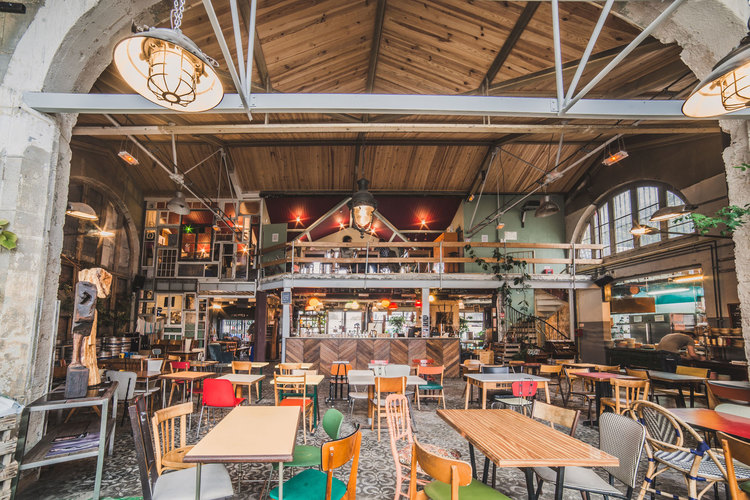
So what role for agriculture? Can a regenerative agriculture, through better work with soil, sequester carbon to fight climate change? And can this be done whilst giving the most vulnerable food security and also food sovereignty?
According to the growing Regenerative Agriculture movement “we must look beyond emissions reduction and push policymakers to make carbon sequestration via regenerative organic agriculture a key tool for reversing global warming…even if we were to cut all human-induced greenhouse gas (GHG) emissions today, the globe would continue to warm for decades or even centuries to come. However, there is hope. There is growing scientific evidence that regenerative organic agriculture can reverse global warming by drawing carbon underground through the natural process of photosynthesis, while at the same time delivering other essential ecological, economic, and health benefits.”
As part of the International Year of Soil, the UN Food and Agriculture Organisation produced this snappy little video to help explain how soil can be part of the climate change solution.
This explains just how much carbon the soil does store, could store, but also looses because of industrial practices.
IFOAM – Organics International (the International Federation of Organic Agriculture Movements) have also communicated on this topic in recent days.
“With almost 800 million people suffering from hunger, we need to prioritize the right to food and food security. If, in the name of fighting climate change, land used by local farmers to produce food is acquired for use in carbon offsetting projects, then a further 600 million could be at risk of hunger by 2080. We don’t want to see the agreement include terms such as “net-zero”, “climate neutral” or “carbon neutral” which could lead to this. We want to see commitment to tackling activities with the highest emissions, such as fertilizer use, particularly in ‘high-emitting’ countries.” They point to the importance of land in more detail here and have released a video (below).
They also note that industrialized farming costs $3.33 trillion per year in environmental damage, through practices such as Nitrogen fertilizer production, transport and application. “Industrial farming is one of the major drivers of climate change, and business as usual is not an option, “ states André Leu, President of IFOAM – Organics International. “Only a transition to agroecology and organic farming can lead to deep cuts in emissions from food production. Unless farmers are given the agro-ecological technologies they need to meet the challenges posed by climate change, impacts on food production will be devastating, pushing millions into poverty.”
CLIMATE GENERATIONS AREA NOVEMBER 30 – DECEMBER 11, NEXT TO PARIS LE BOURGET
This area is dedicated to projects proposed by civil society that are tied in with the fight against climate change. It is open to the general public.
PLACE TO B, NOVEMBER 30 – DECEMBER 11, ST CHRISTOPHER’S INN GARE DU NORD – 5 RUE DE DUNKERQUE, PARIS
Place to B is creating an innovative and multidisciplinary information factory, with the ambition of writing a different narrative about climate issues and creating a unique newsworthy momentum during the COP21 in Paris, December 2015.
4/1000 INITIATIVE: SOILS FOR FOOD SECURITY AND CLIMATE, DECEMBER 01, PARIS LE BOURGET
The “4/1000 Initiative: Soils for Food Security and Climate” aims to ensure that agriculture plays its part in combating climate change. A 4/1000 annual growth rate of the soil carbon stock intends to show that even a small increase in the soil carbon stock (agricultural soils, notably grasslands and pastures, and forest soils) is crucial to improve soil fertility and agricultural production and to contribute to achieving the long-term objective of limiting the temperature increase. Andre Leu, President of IFOAM – Organics International will be speaking here.
FARMER’S DAY AT COP21, DECEMBER 2, PARIS LE BOURGET
Farmers Day brings together farming groups, researchers, civil society, and other advocates to share perspectives on agriculture in light of the United Nation climate change negotiation this December in Paris. See in particular the session “Agroecology as a viable solution to create climate resilience and a sustainable food system” from 16:45—18:15 in Room 5.
INTERNATIONAL RIGHTS OF NATURE TRIBUNAL, DECEMBER 4-5, PARIS
The Tribunal is a unique, citizen-created initiative. It gives people from all around the world the opportunity to testify publicly as to the destruction of the Earth — destruction that governments and corporations not only allow, but in some cases encourage. It is open to the public, but registration is required because space is limited.
GLOBAL LANDSCAPES FORUM, DECEMBER 5-6, PARIS
This Forum will leverage this historic opportunity to shape the world’s development agenda for decades to come. Over the past two years, the Global Landscapes Forum has evolved into the world’s leading platform for discussing land-use issues. In Paris, the Forum will bring together 2,500 stakeholders from across sectors, including forestry, agriculture, water, energy, law and finance.
The ZAC – Climate Action Zone.
In a working class neighbourhood north of Paris, in a cultural centre open to the city, the CENTQUATRE, will hold a “Climate Action Zone” during the last week of the COP21.
From December 7 to 11, the CENTQUATRE-Paris will host the Climate Action Zone (ZAC). For five days, this hub of international creativity, which offers popular and contemporary programming, will be a central place for citizen’s mobilization: the headquarters of Coalition Climat 21.
The ZAC will be an information place (screenings, participate in discussions or discover art exhibitions about climatic disruption.) The ZAC will be the place to increase the rhythm of the mobilisations; demonstrations in the streets, symbolic actions, artistic happenings will be prepared at the CENTQUATRE. A general assembly held each afternoon will bring everyone up to date with the state of negotiations at the COP21, as well as the day’s actions and those planned for the next days.
A total of 150 events are scheduled over the five days.
Programme of Events which includes a on December 11
Agriculture industrialisation: a false solution to climate disruption Confederation Paysanne + Via Campesina
CENTQUATRE Forum ouvert 13.00HRS
Soil Solutions to Climate Problems Center for Food Safety CENTQUATRE Atelier du Haut 14.00HRS
Watch Center for Food Safety Soil Solutions to Climate Problems video narrated by Michael Pollan
More
(added 30/11/2015)
Regenerative Organic Agriculture and Climate Change: A Down-to-Earth Solution to Global Warming (Rodale Institute)
Adaptive multi-paddock grazing could determine, mitigate greenhouse gas emissions (Science Daily)
Evidence for the success of Regenerative Agriculture (new)




